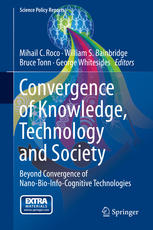

Most ebook files are in PDF format, so you can easily read them using various software such as Foxit Reader or directly on the Google Chrome browser.
Some ebook files are released by publishers in other formats such as .awz, .mobi, .epub, .fb2, etc. You may need to install specific software to read these formats on mobile/PC, such as Calibre.
Please read the tutorial at this link: https://ebookbell.com/faq
We offer FREE conversion to the popular formats you request; however, this may take some time. Therefore, right after payment, please email us, and we will try to provide the service as quickly as possible.
For some exceptional file formats or broken links (if any), please refrain from opening any disputes. Instead, email us first, and we will try to assist within a maximum of 6 hours.
EbookBell Team

5.0
88 reviewsThis volume aims to document the most important worldwide accomplishments in converging knowledge and technology, including converging platforms, methods of convergence, societal implications, and governance in the last ten years. Convergence in knowledge, technology, and society is the accelerating, transformative interaction among seemingly distinct scientific disciplines, technologies, and communities to achieve mutual compatibility, synergism, and integration, and through this process to create added value for societal benefit. It is a movement that is recognized by scientists and thought leaders around the world as having the potential to provide far-reaching solutions to many of today’s complex knowledge, technology, and human development challenges. Four essential and interdependent convergence platforms of human activity are defined in the first part of this report: nanotechnology-biotechnology-information technology and cognitive science (“NBIC”) foundational tools; Earth-scale environmental systems; human-scale activities; and convergence methods for societal-scale activities. The report then presents the main implications of convergence for human physical potential, cognition and communication, productivity and societal outcomes, education and physical infrastructure, sustainability, and innovative and responsible governance. As a whole, the report presents a new model for convergence. To effectively take advantage of this potential, a proactive governance approach is suggested. The study identifies an international opportunity to develop and apply convergence for technological, economic, environmental, and societal benefits. The panel also suggests an opportunity in the United States for implementing a program aimed at focusing disparate R and D energies into a coherent activity - a "Societal Convergence Initiative”. This study received input from leading academic, industry, government, and NGO experts from the United States, Latin America, Europe, Asia, and Australia.